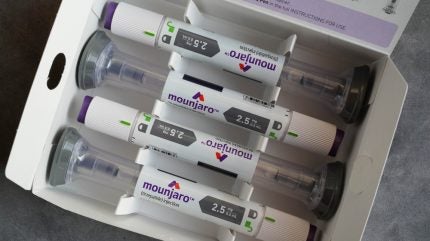
As weight loss market rival Novo Nordisk drew headlines for starting a bidding war over a potential $9bn acquisition of Metsera, a reserved Eli Lilly posted Q3 results that blew past analyst expectations.
Demand for Lilly’s weight loss drug tirzepatide, known under the brand names Zepbound and Mounjaro for weight loss and type 2 diabetes (T2D), respectively, fuelled much of the quarter’s growth.

Discover B2B Marketing That Performs
Combine business intelligence and editorial excellence to reach engaged professionals across 36 leading media platforms.
Mounjaro generated sales of $6.5bn in Q3 2025, up 109% from the same period in 2024. Zepbound exhibited even higher growth – up 185% from Q3 2024 – to bring in $3.6bn. Lilly said stronger demand globally for weight-loss drugs offset lower prices.
Investors welcomed the strong results. Lilly’s shares closed at $844.50 on 30 October, up 3.6% from the prior day’s close. The US big pharma company has a market cap of $757bn.
Tirzepatide’s performance could herald a changing of the guard in the pharma industry. The drug’s sales have overtaken MSD’s Keytruda (pembrolizumab) – an immunotherapy that has been the top-selling drug globally over the past few years.
Total revenue for Lilly in Q3 2025 increased 54% to $17.6bn compared with Q3 2024. The reported revenue represents a 9.91% overtake beyond the Zacks consensus estimate of $16.01bn.

US Tariffs are shifting - will you react or anticipate?
Don’t let policy changes catch you off guard. Stay proactive with real-time data and expert analysis.
By GlobalDataAs a result of its strong performance, the US drugmaker increased its 2025 full-year revenue guidance to between $63bn and $63.5bn, up from a previous target of $62bn.
The strong quarter is notable given that CVS Caremark—the biggest pharmacy benefit manager in the US — said it would make Novo Nordisk’s rival drug Wegovy (semaglutide) the preferred GLP-1RA treatment on its template formularies from July 2025.
The commanding quarter from Lilly also had particular significance given the financial affairs occurring over at its main rival in the weight loss treatment market.
Novo Nordisk became embroiled in a bidding war on the same day Lilly posted its Q3 results, with the Danish pharma company bidding $9bn to acquire Metsera. Pfizer had already agreed to buy Metsera according to a deal announced in September. Pfizer, which does not have a weight-loss drug, blasted Novo’s offer as “reckless”. Metsera is developing longer-lasting GLP-1RAs, with Novo keen to add the candidates to its Wegovy and Ozempic brands.
Despite strong sales, Lilly is already eyeing further growth in the weight loss market. Chief among future revenue streams is the anticipated oral GLP-1RA avenue. The US big pharma company plans to submit its candidate, called orforglipron, to the US Food and Drug Administration (FDA) for regulatory review in obesity this year, with a T2D application coming in 2026. GlobalData analysts forecast orforglipron sales could reach $11bn in 2031.
GlobalData is the parent company of Pharmaceutical Technology.
Lilly has already unveiled plans to construct a $6.5bn facility in Texas to manufacture the pill, and has also invested $1.2bn to expand a site in Puerto Rico for the same purpose.
Novo is not alone in making big money moves in the weight loss space. In August, Lilly agreed to pay up to $1.3bn to Superluminal Medicines to discover and progress small-molecule therapeutics for G protein-coupled receptors (GPCR) targets within the cardiometabolic and obesity space.
Lilly’s CEO, David Ricks, said on a conference call: “Revenue from key products more than doubled as our medicines continued to increase their global impact. In the US, Lilly gained market share in the incretin analogues market for the fifth consecutive quarter.”
Lilly’s chief financial officer, Lucas Montarce, said: “Lilly incretins gained share of market compared to Q2 2025, and approximately two out of every three new prescriptions in the incretin analogue market is a Lilly medicine.”




